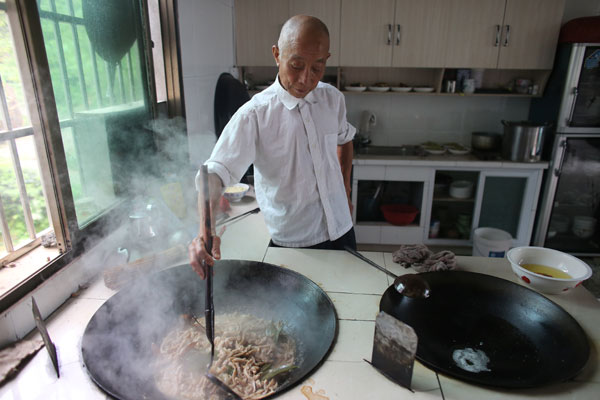"We don't have a mosque in my home village, because there are only a small number of Hui people there, so if I am at home, I will drive here to do Salah," Huang said, looking round at his fellow worshippers, about 30 men in white skull caps.
Li Saijun, the imam, chanted a text from the Quran in Arabic, and the worshippers knelt or stood in accordance with his words.
Although the mosque is the only one in Taojiang, pressure of business prevents many Muslims from attending, so the crowd for the Friday Salah usually only numbers about 30 to 40 people.
"I think the north has a much stronger religious atmosphere than the south," said Huang, who studied at an Arabic school in Henan province for a short while.
Although business means he usually spends most of the year in Fujian province, Huang finds it easy to maintain his religious duties. "In Fujian, there are more mosques than here, because so many foreign Muslims live there or visit the place," he said.
Li Saijun said people, especially young men, are often very busy with work, which means they may not have time to attend Salah in the mosque, but that they can always make amends at a later date.
"If you are too busy to perform Salah, it's OK. You can make it up later," he said, referring to the five prayer sessions held every day.
"Sometimes, young people are busy doing business or working at factories," he added.
Improving living standards
 |
|
Zhabu resident Li Ruqing, 75, cooks traditional Muslim-style beef. [Wang Jing / China Daily]
|
Many young people either go to the major cities to seek opportunities, or work in local core-board factories. In Jungongzui, a village near Laowuwan, or Ancient House Bay, which is home to the descendants of the original Li clan from Beijing, is Hunan's largest core-board factory, owned by Hongsen Wood Co. Zhabu is the largest core-board manufacturing base in Central and Southern China. In 2013, the town's core-board industry earned revenue of about 1 billion yuan ($161 million), raising local people's living standards, according to Li Penghui, the town's 34-year-old deputy head.
Because of ongoing construction work and the constant drizzle, the road leading to the Hongsen Wood factory is so churned up that every passing vehicle is quickly covered in mud.
Twenty years ago, Zhabu was desolate and poverty-stricken, but the economic upturn that followed the development of the local core-board industry has seen living standards rise, and the residents now live peaceful and relatively prosperous lives.
At the back of a white-tiled house, the drizzle, green bamboo trees and damp walls looked like a quaint, poetic Chinese painting. In the kitchen, 75-year-old Li Ruqing was busy cooking Islamic-style beef and chicken according to a special recipe he learned more than 40 years ago. He is often invited to help people cook Islamic-style food on special occasions such as Id al Fitr, or the Fast-Breaking Festival, which follows the holy month of Ramadan.
Li Jincai, 62, the owner of the house, was preparing special cakes made of sticky rice flour and salt, fried in sesame oil, which are popular at festival times. "In the past, these cakes were made to help the poor. The success of the local core-board industry mean there's little need for that these days, but we maintain the tradition anyway," he said.
We recommend:
